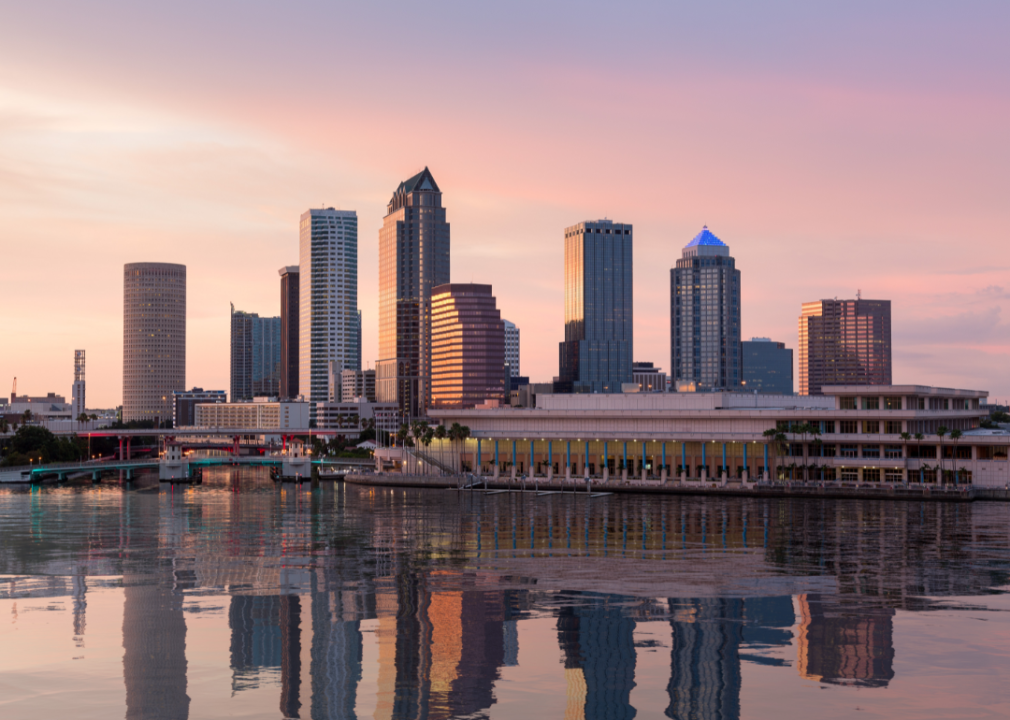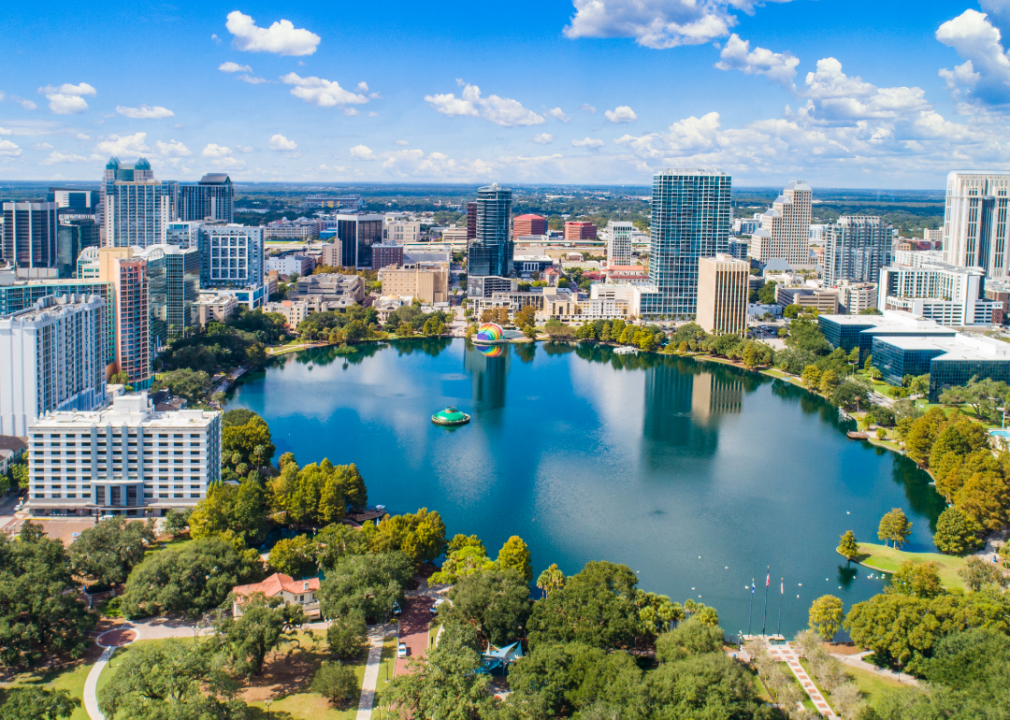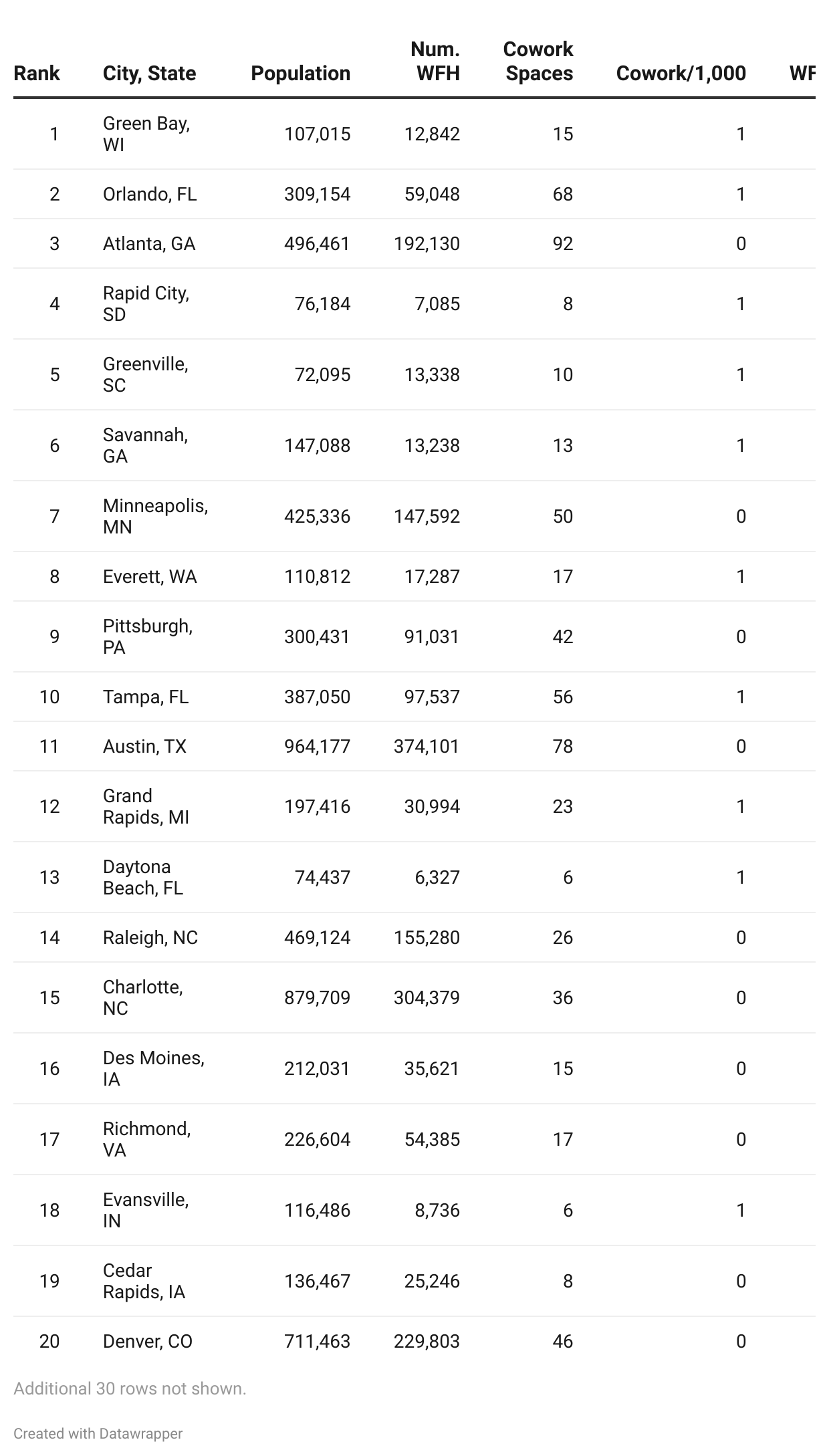The COVID-19 pandemic changed the way that we work. In-office attendance in some U.S. markets dropped 70-90% in 2020, according to the McKinsey Global Institute. The same research notes that in-office hours were 30% below pre-pandemic levels in 2022, with U.S. workers reporting to the office an average of 3.5 days.
The 2024 Renter Preferences Survey Report supports these findings. The largest group of renters surveyed (39%) were hybrid employees who worked from home a few times a week. Another 31% worked from home on a full-time basis. Remote work and hybrid work appear to be here to stay.
Recommended Videos
This shift away from the office hasn’t just changed the way people work in the United States. It’s changed where they live, too.
The top cities for hybrid work are located all over the country. They include major urban hubs and small cities.
To find the best cities for hybrid workers, Rent ranked cities based on the coworking spaces per 1,000 work-from-home employees. This survey ranks the percentage of the population that works from home and measures the cost of living index. All features were weighted equally to come up with a score.
Affordable properties
Commute length isn’t as important when workers aren’t going into the office so often (or at all), so a key benefit of apartments in the often expensive city centers disappeared almost overnight. Yet rent prices rose 4.77% across the country between December 2021 and December 2022, followed by another marginal uptick between the end of 2022 and October 2023.
Saving money became a key concern for many renters. Many remote or hybrid workers moved away from properties in the city center and relocated to more affordable metros, cities, suburbs, and neighborhoods.
A lower cost of living
Relocating to a city with a lower cost of living index can save even more money. In addition to housing prices, the cost of living index also measures the price of food, utilities, transportation, health care, and miscellaneous goods and services.
The average cost of living in the U.S. is reflected with a value of 100. So a score of less than 100 means a city is more affordable than the national average. A score over 100 means that city is more expensive than average.
Now, let’s look at the 10 best cities for hybrid work. Half of the 10 best cities for hybrid work are located in the South. Another three are found in the Midwest. The Northeast and West also claimed one community each.

Canva
10. Tampa, FL
The cost of living in this culturally rich and diverse community on Florida's Gulf Coast is almost exactly the same as the national average – 99.8.
The city has a robust hybrid workforce. A quarter (25.2 percent) of Tampa's residents work from home in some capacity. That's easy to do when there are 56 coworking spaces in the city, roughly one for every two remote workers.

Canva
9. Pittsburgh
Next up is Pittsburgh, the only Northeastern city on this list. Pittsburgh thrived as a Gilded Age industrial and cultural hub. It's expanded to include 90 unique neighborhoods joined by hundreds of bridges.
The cost of living in Pittsburgh is comparable to the national average (100.4). But it's much more affordable than many of the other major metropolitan areas in the Northeast, one of the most expensive regions in the country.
A substantial portion of Pittsburgh's 300,431 citizens (30.3 percent) are hybrid workers. A respectable 42 co-working spaces rest within the city limits.

Canva
8. Everett, WA
Bicycle-friendly Everett is the only Western city you'll see here. Find this creative coastal city just off Puget Sound, 25 miles north of Seattle.
A cost of living index of 111.8 makes Everett the most expensive metro listed here. But it's still more affordable than many other West Coast communities, which regularly top lists of the most expensive metropolitan areas in the country.
Everett is a small, approachable city (population 110,812), but it still supports remote work employees, who make up 15.6 percent of the city's population. There are 17 co-working spaces in Everett.

Canva
7. Minneapolis
Minneapolis is Minnesota's artistic and cultural center. Located along the Mississippi River, it also offers acres of parks, green space, and lakes for residents to enjoy.
It's a good bet for remote workers too. There are 50 coworking spaces in Minneapolis. This support system has helped attract 147,591.6 (and counting!) hybrid workers to Minneapolis already. They comprise just over a third (34.7 percent) of the city's population.
A cost of living score of 98.99 means it's slightly cheaper to live in Minneapolis than the national average. Some of these savings came in the form of rent reduction; the Minneapolis–St. Paul–Bloomington metro saw the largest year-over-year rent decrease in the country between December 2021 and December 2022.

Canva
6. Savannah, GA
This coastal Georgia city oozes charm and historic ambiance, from its cobblestone squares to the shady parks and stately oak trees draped with Spanish moss.
The cost of living index in this community is lower than the national average at 90.1. A total of 13,237.92 Savannah residents currently work from home in some capacity.
Savannah supports 13 co-working spaces. That's a relatively high number (nearly one co-working space for every thousand workers), considering that hybrid workers currently make up 9 percent of the city's workforce.

Sean Pavone // Shutterstock
5. Greenville, SC
Remote workers move to Greenville for a quaint Main Street, a robust art scene, and easy access to lakes, hills, and trails in Paris Mountain State Park and beyond. A low cost of living (90.6) is another benefit for residents.
With a population of just 72,095, Greenville is the smallest city in the top 10. But despite its modest size, it's still attracted and supported 13,337 hybrid workers.
These hybrid work employees make up 18.5 percent of the city's population. You can find them working from home and at 10 coworking spaces throughout the community.

Jacob Boomsma // Shutterstock
4. Rapid City, SD
With a population of 76,184, Rapid City is the second smallest city here. But it's the largest community in the Black Hills, a region of jagged peaks, lush forests, and almost impossibly scenic byways and hiking trails in western South Dakota.
A cost of living index of 93 means it's more affordable to live in Rapid City than the national average. South Dakota stayed affordable throughout the pandemic as well. It was one of only two states where rent prices didn't increase in the early months of the pandemic.
Rapid City is well-equipped to handle remote work, as the city currently houses eight coworking spaces. That means you'll find 1.1 coworking spots for every remote worker, one of the strongest showings on our list. These hybrid employees make up 9.3 percent of the city's population.

Canva
3. Atlanta
Atlanta is a commercial and cultural hub and a historical powerhouse that was central to both Civil War and Civil Rights history. With a population of 496,461, Atlanta is both the largest city in Georgia and the most populous city on our list of hybrid work hot spots.
It's also home to the largest hybrid workforce in the top 10 — 38.7 percent of Atlanta residents work from home at least part of the time, beating the famous Atlanta traffic a couple of days per week. They're supported by 92 coworking spaces.
The cost of living index is 101.6. That means it's slightly more expensive to live in Atlanta than the national average.

Canva
2. Orlando, FL
Orlando is famous for Walt Disney World and Universal Orlando. But the sunshine and comfortable climate that draw tourists to central Florida also attract remote workers ready for a change of scenery.
Hybrid workers currently make up 19.1 percent of Orlando's population of 309,154. Find them at one of the city's plentiful coworking spaces. You'll find 68 coworking spaces in Orlando, just over 1.2 for every thousand remote workers. That's tied for the most on this list.
The cost of living in Orlando is 104.8. That's more than the national average.

Canva
1. Green Bay, WI
This laid-back, bayside city is perhaps best known for its professional football team, The Green Bay Packers. But Green Bay's outdoor recreation opportunities and home-grown shops, restaurants and breweries appeal to all ages.
A household budget goes further here. With a cost of living index of 89.9, Green Bay is the most affordable city in our top 10 spots for hybrid working.
Green Bay is one of the smaller metros on this list, with 107,015 residents. But it does a good job of supporting the 12 percent of the population that works remotely. Currently, Green Bay houses 15 coworking centers. That's 1.2 coworking spaces for every thousand workers – the highest on this list.

Rent
The takeaway for hybrid workers
The pandemic changed how — and where — people work in the U.S. The best cities for hybrid work support the remote workforce with coworking spaces, affordability, and a sense of community outside of a traditional office.
Rent prices are based on an average from Rent's available rental property inventory as of November 2023. The rent information included in this article is used for illustrative purposes only. The data contained herein do not constitute financial advice or a pricing guarantee for any apartment.
This story was produced by Rent and reviewed and distributed by Stacker Media.




